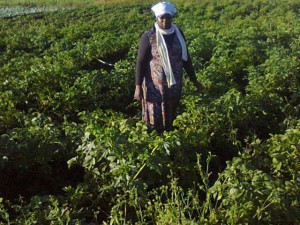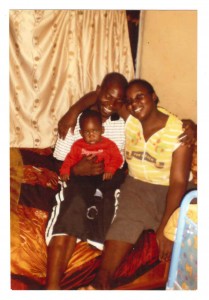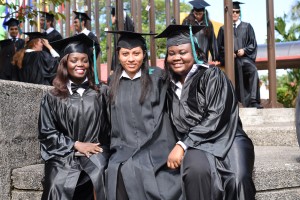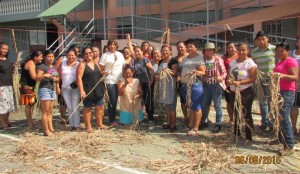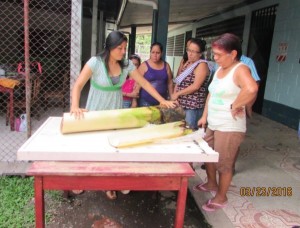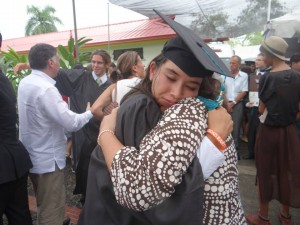Cultivating Empowerment
Stories of EARTH University women changing their communities
Since its founding, EARTH University, at times, has faced challenges to admit an equitable population of female students. For one, convincing rural families that their daughters should be free to study agriculture in a foreign nation, far from home, can be a major hurdle. Other reasons involve either culturally imposed limitations and expectations regarding appropriate “roles” or rural families’ historically low financial resources that often have hindered such girls from completing primary school, let alone high school – thereby making them ineligible for a university education.
“In many regions, agronomy is seen as men’s work,” said Junior Acosta Peña, head of admissions at EARTH University. “We’ve had to work very hard to change that perception.”
These barriers persist, but thankfully their pervasiveness has been receding little by little. Year after year, the number of women on campus has grown toward true gender parity. In fact, last year’s incoming class is majority female – a first for the University. This year’s freshman cohort, the Class of 2017-2020, is 48.7 percent female.
“We [at EARTH] have long understood the value of women’s participation at the University and in society at-large,” Acosta added. “It was and is a necessity for us to offer equally robust opportunities to them. We’re thankful to The MasterCard Foundation for support in this endeavor.”
EARTH University has a unique way of improving the lives of women, who, in turn, improve the lives of others. Here are four stories of EARTH women whose hope for a better world extends far beyond themselves, whose hope turns to bold action.
The sophomore
The MasterCard Foundation Scholar Esnath Divasoni (’19, Zimbabwe)
In their second year at EARTH, students receive a real-world education by operating full-fledged entrepreneurial projects.
For Esnath Divasoni, schooling is precious. After her father lost his job in 1999, her family’s financial struggles placed her on the verge of dropping out. Fortunately, she received a helping hand at 13, when she became a Camfed scholar in her town of Wedza, Zimbabwe.
Camfed (Campaign for Female Education) is a non-profit organization that, in its 24-year existence, has funded the secondary schooling of more than 1.2 million girls from low-resource households in five African nations. Camfed paid for Esnath’s tuition for five years, as well as provided her with school uniforms, hygiene products, books and the support of the organization’s alumni network.
A year after becoming sponsored, Esnath got her first taste of farming. Her father received a 6-hectare plot through the land reform in Zimbabwe. She learned how to grow maize, tobacco and peanuts by working alongside her father on the weekends. Her weekdays, however, were spent walking the daily 12-km round trip to and from school and studying until dark.
After graduating from secondary school in 2006, Esnath hoped to attend university. Camfed supports its girls well into womanhood, but only a small number is sponsored to attend university. Esnath wasn’t one of them.
During the next 10 years, she tirelessly applied for scholarships, took accounting classes at a technical college, and worked various jobs – from being a maid in Botswana for $50 a month to farming potatoes thanks to a $500 microloan from Kiva, an online lending platform.
Back in early 2014, she was repaying that loan’s interest by volunteering at Camfed’s Zimbabwean office in the capital, Harare. One task was coordinating a trip funded by The MasterCard Foundation – a program taking 15 women from Zimbabwe, Zambia and Tanzania to learn about Patsari eco-stoves, solar water heaters, and sun-powered dehydrators for six weeks. The destination: EARTH University.
She wasn’t invited to attend the trip to Costa Rica in 2014, but came to learn a great deal about the University and, unbeknownst to her at the time, her own future.
Less than a year later, Esnath eagerly awaited a decision on her last-minute application to EARTH University. After praying 10 years for the opportunity of a university education, she earned her admission and a full scholarship through The MasterCard Foundation. She often jokes that her earlier inability to get funding was fate’s way of helping her find EARTH.
Only in her second year, Esnath is already planning her future contribution to Zimbabwe. She is determined to construct a demonstration farm and processing plant to teach women how to grow diverse microgardens, set up greenhouses, harvest water in places with infrequent rainfall, produce biogas and conserve energy.
“In my community, there are no bakeries, no production,” she said. “I want to initiate value-added opportunities to create jobs and grow skills for women who haven’t had the opportunity to attend university.”
In this effort, she hopes to team up with two of her classmates, Memory Jinga (’19, Zimbabwe) and Forget Shareka (’19, Zimbabwe), to launch one such farm in each of their home villages. Each of the three women has complementary specialties, Esnath said. She considers her talents to be in crops and conservation, Memory’s in alternative energy, and Forget’s in animal husbandry and “convincing people to change their ways.”
She recognizes that getting to this point has been very difficult.
“The community I come from thinks educating a girl is a waste of money because she’ll just end up getting married,” Esnath said, adding that she was one of only seven females in her 40-student senior class. And, of those, many were already pregnant.
She also remembers the nights in the late 1990s, before Camfed’s intervention, when her family would go hungry in an attempt to save enough money to buy her school uniform.
In 2009, she met Lameck, a male volunteer in Camfed’s Harare office. Almost immediately, they began dating and pooling their monthly stipends together to pay for Esnath’s accounting courses.
They were married in 2010, when she was 21 – “very, very old” by her community’s standards, she notes – and gave birth to their son, Adel, a year later. This further complicated her higher education ambitions.
“I wasn’t sure my in-laws would accept my desire to continue my education,” Esnath said. “In my culture, if you’re married, you can’t leave your family for any reason. I was scared to tell them because, if they said ‘no,’ I wouldn’t be able to leave.”
Esnath and Lameck spoke with her mother’s brother, a well-respected member of the family.
“My uncle told us he was worried I’d turn out to be just a housewife,” she recalled. Thanks to his influential approval, the rest of the family supported her desire to study in Costa Rica.
“I survived a village that told me a girl can’t have an education,” she reflected. “I’m a married woman going out to get an education and support my family. I defeated the odds.”
She returned home to visit her family in December of her first year, a surprise trip thanks to The MasterCard Foundation. She arrived during the farming season and observed more keenly the struggles of peasant farmers. She’s ready to collaborate and innovate her country out of these problems.
“I am a product of community involvement,” she said. “Therefore I am indebted to my community and will invest myself in its development.”
The senior
The MasterCard Foundation Scholar Johana Carmona (’17, Colombia)
In their final year at EARTH, students prepare for their return to their homes, to put their educations to use for their communities and to implement their intended change agendas.
Johana Carmona grew up in La Unión, a small farming municipality nearly 60 kilometers outside Medellín. It’s a place deeply shaken by the decades of violence that have gripped Colombia.
Much of that violence recently came to an official end. The 2016 Nobel Peace Prize was awarded to Colombian President Juan Manuel Santos for his administration’s peace talks with the FARC, the principal leftist guerrilla group in the country.
Many hailed the disarmament deal as a major step toward healing the country; however, it leaves the futures of some Colombians in limbo, including the rural women who’ve defected from the guerrilla.
“For a woman of this social standing, there are already few opportunities, mostly cooking and cleaning,” Johana said. “And if that woman is a former guerrilla, there are even fewer because people feel uneasy around them.”
To help combat this prejudice, Johana plans to initiate a pilot program that teaches these forgotten women farming and business skills, believing it will have a strong social impact.
“While these prejudices are reduced, these women need an opportunity to work. They need spaces to demonstrate that they’re capable. They need opportunity. I want them to exchange their guns for farming tools,” she said, referencing the surrendering of guerrilla arms to the United Nations.
Johana intends to build a Community Supported Agriculture (CSA)-style arrangement that delivers baskets of high-quality produce and value-added goods (breads, jams, cheeses, etc.) to customer households near her home – baskets with products sourced entirely from post-conflict women, ensuring them each a market for their goods and a fair share of the profits.
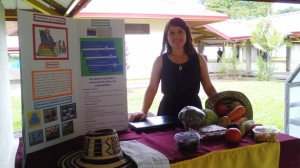
Johana poses with her project plan, a finalist for the Sustainability Prize. (Source: Johana Carmona)
Currently, Johana is enrolled in EARTH’s new Master’s Degree in Agribusiness Innovation in addition to her fourth-year undergraduate studies. She originally strove to study agribusiness as a way to help her father, who she’d seen struggle to repay crippling loans from destroyed crops and questionable governmental policies.
Her parents have ambitions of turning their 1-hectare farm into a destination for eco-tourists. Johana believes her EARTH education will help her to assist them in building their dream and, in turn, enable them to do their part to transform the scarred region into a place of tranquility and prosperity.
“When I was very young, various neighbors had to abandon their homes by force or from fear. Many were murdered by either the FARC or the opposing paramilitary group,” she said. “Yes, I hold some resentment for all that’s happened, but I just want peace for my people. What is the solution, if not peace? And if we want a peaceful society, we need to reintegrate the outsiders and outcasts into our communities.”
The graduate
The MasterCard Foundation Scholar Sindy Ramos (’16, Guatemala)
After graduation, EARTH students implement the changes they’ve prepared themselves to make during their four years at the University.
Sindy Ramos is one example of countless EARTH graduates springing into action in support of their communities.
While a student at EARTH, she learned of a group of Ecuadorian women who use banana stalks, a waste product, to make durable goods and, in the process, helped to pull themselves out of abject poverty.
During her third-year studies, Sindy raised $12,000 in funds and services – through sponsorships from The MasterCard Foundation, University departments such as the Permanent Education Program (PEP) and the Grameen Association of Costa Rica, among others – to fly three of those Ecuadorian artisans to EARTH’s campus. In June of 2015, the trio arrived and over a span of five days, trained 35 women from rural Limón, Costa Rica, in the art of producing and selling natural banana fiber products – bags, hats, bracelets, wallets and more.
Sindy was confident this concept would serve the rural banana-growing area well because its barrier to entry is very low and its primary input is an otherwise-trashed material, making the work accessible to even the poorest of people.
The success of her trial run in Costa Rica emboldened her to launch the project in her homeland of Guatemala – specifically in Tiquisate, a rural, banana-producing region.
“A lot of bananas means a lot of opportunity for work,” she said. “In Tiquisate, there are many poor women and many more bananas.”
For the workshop in Guatemala, she plans to include Maritza Pérez, one of the Costa Rican women enabled through her graduation project two years ago. Since being trained, Pérez has been selling her products at farmer’s markets along with hosting her own trainings on the production technique.
“[Maritza] told me she’s now a proud, self-made businesswoman who’s no longer in need of anyone’s handouts to care for herself,” Sindy said. “She is not selfish about her success, either. She uses her knowledge to help others pull themselves out of their economic situation, and she refuses to charge very poor women who want to learn from her.”
In time, Sindy would like to form a team of associates and artisan labor cooperatives to aid in marketing and help grow the customer base. She’s also gearing up to reach new buyers by selling many of their products on Amazon.com Handmade under the brand name Inkine’y (meaning “banana” in the indigenous K’iche’ language).
“I want to expand the network of support for these rural women,” she said. “I see potential in them. They don’t have education, access to development, or jobs, but they’re eager to learn and to work. I’m providing them with a path to self-employment.”
She has plans to use any future profits to provide educational scholarships for low-income children who struggle as she once did. Her mother died when Sindy was only 13 and her father abandoned the family two years later. Sindy was left to take care of her younger sister on her own, working in a customer service role to make ends meet.
“My greatest challenge in life was convincing others to help me,” she said. Since then, she’s been receiving that help. At the end of 2016, she won the Sustainability Lab’s Sustainability Award along with $10,000 in seed funding.
Today, Sindy lives in Villa Nueva, near Guatemala City, as she continues organizing for the launch of her banana fiber initiative in Tiquisate. Her little sister, who lives with a boyfriend and has a 6-month-old child, hasn’t enrolled in any university or technical program since graduating high school. Sindy continues encouraging her to study. She recognizes the impact her university education at EARTH has had on her.
The staff member
Ana Elsa Mancía Vides, Manager of Third-Year Work Experience (La Flor)
Ana Elsa Mancía Vides began her employment at EARTH in Jan. 2014 as part of the Permanent Education Program (PEP) – the office that, among its many duties, oversees placement of students in farms near the University’s Guácimo campus for their community development experiences.

Ana Elsa Mancía (glasses hanging from shirt collar) stands with a group of women from La Lucha and Santa Rosa, neighborhoods near EARTH’s Guácimo campus. (Source: Ana Elsa Mancía)
Salvadorian by birth, Mancía left her home country for Guatemala in the 1980s to escape the civil war and to study agronomy.
Between 1990 and 2013, Mancía worked off-and-on for the association Vivamos Mejor (meaning “Live Better” in Spanish), a private, non-profit Guatemalan NGO that promotes sustainable development and community self-management among the country’s rural populations. She had started as a volunteer after graduating from university the year before. The initiatives she led changed periodically, but one of the most impactful was working in the southwestern Guatemalan Department of Sololá, among three indigenous groups – the Kaqchikel, the Tz’utujil and the K’iche’.
“I have always felt a connection to rural communities and social work,” Mancía said, recalling how she became involved with Vivamos Mejor. “This new NGO’s restlessness to help rural populations allowed me to connect agriculture with a serious social commitment.”
Mancía was struck by the reality of rural Guatemala: Girls attend school only until the third grade before they’re pulled out to work at home.
“It’s one of the huge injustices that still exists,” she said.
As a result, the majority of rural females are illiterate in their native language and don’t know how to speak Spanish – a considerable disenfranchisement compared to rural men, who are better educated. The women spoke tribal languages, posing even more challenges for the Spanish-speaking Mancía. At the time she was a single mother raising her daughter in a “completely isolated” and isolating places – often with no potable water, no cell phones, no electricity.
In her various roles in the NGO, Ana Elsa trained these women in different skills, including self-esteem building, leadership, reforestation, agroforestry, organic coffee production, female empowerment, entrepreneurship, growing native plants, sausage-making and family planning.
These experiences prepared her for the transition into her current role, leading community work experience placements for third-year EARTH students around the La Flor campus in Guanacaste Province, Costa Rica. It’s a role that helps her bring positive changes to rural Guanacaste by matching regional producers, businesses, non-profit groups and local farmers with the third-year EARTH students who spend six weeks there.
Students develop and carry out three distinct socio-sustainable development projects – spending Mondays and Tuesdays working at a local agribusiness, Wednesdays in classes, Thursdays and Fridays implementing their community projects, and evenings and weekends assisting their host families. These professor-reviewed projects expose students to learning about areas, lifestyles, and crops that contrast those of the humid tropics of Guácimo.
“Ninety-five percent of our hosts are women: widows, retirees, single mothers,” Mancía said, adding that the women really benefit from the students’ contributions – biodigestor installations, improved animal husbandry projects, diversified family gardens, better waste management systems and more.
Positive change can take hold more quickly here in rural Guanacaste than in rural Guatemala, as most Costa Rican women already know how to read and write.
Looking back on all her experiences, Mancía recognizes the effect that supporting women has on others, with positive change rippling through communities.
Her daughter, Issa Secaira (’14, Guatemala), grew up to be an EARTH graduate inspired by the experiences she shared with her mother in Guatemala. Issa’s career, carrying out a Vivamos Mejor campaign aimed at enhancing food security for rural women, emanates its own ripples of woman-powered change.

